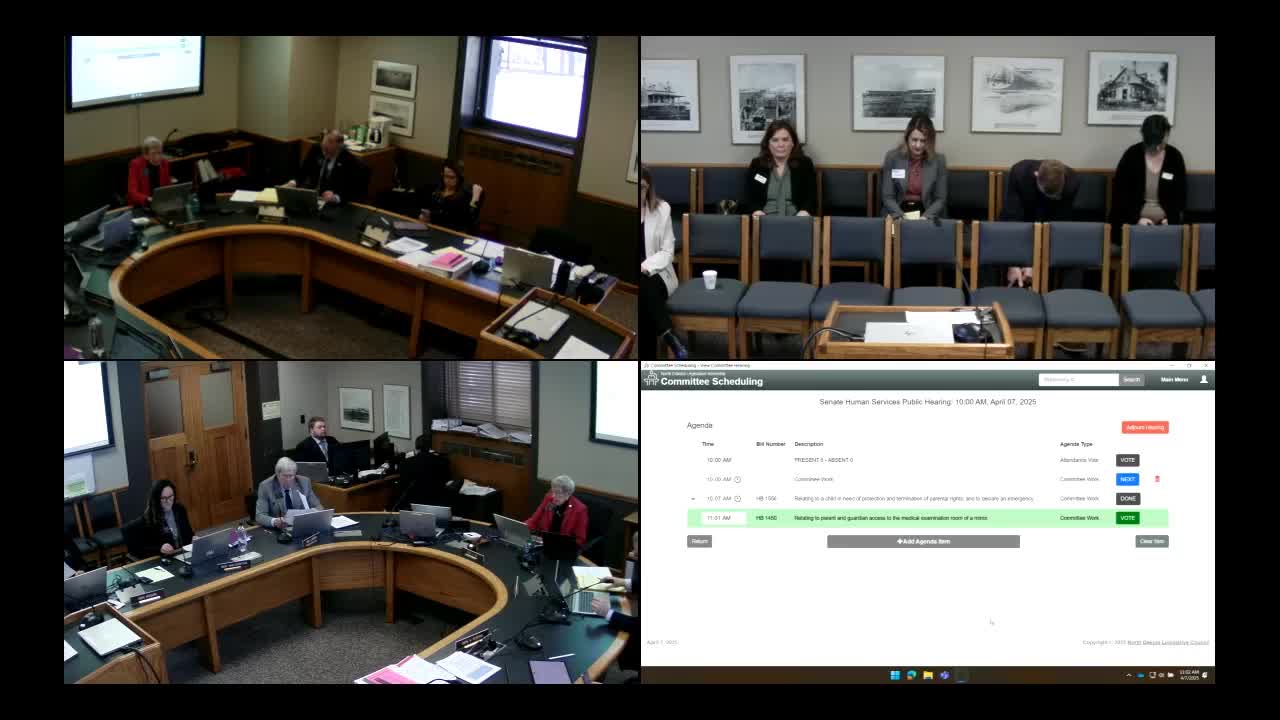Senate Human Services Committee advances parental‑presence bill after heated debate; committee moves measure without recommendation
Get AI-powered insights, summaries, and transcripts
Subscribe
Summary
Committee split over child safety and parental rights; the panel ultimately moved House Bill 1450 out of committee without recommendation after votes and amendment negotiations, including removal of the word "neglect" from a carve‑out and debate over statutory cross‑references.
The North Dakota Senate Human Services Committee on Feb. 9 considered House Bill 1450, a measure addressing whether a parent or guardian may be present during certain medical examinations of minors and what exceptions apply. After multiple amendment attempts and sustained debate about child safety and parental rights, the committee moved the bill out without committee recommendation.
The bill's committee consideration included competing amendments. One amendment (02/2006) corrected a statutory cross‑reference and initially included the word "neglect" in the list of exceptions that would allow a provider to ask a parent to leave. After tie votes and additional negotiation, committee members proposed a compromise amendment that removed the word "neglect" from the exceptions and focused the carve‑out on suspected physical abuse, sexual abuse and human trafficking. The committee recorded a final procedural motion to move the bill without committee recommendation; the motion carried on a 6–0 committee vote.
Why it matters: Proponents said parents are entitled to be present and that the bill protects parental rights and family trust in health care encounters. Opponents warned that keeping parents in the room could prevent victims from disclosing abuse or trafficking, and urged narrow exceptions and careful drafting to preserve forensic exams, mandatory‑reporting processes and other existing legal protections.
Key testimony and debate: Kim Jacobson (zone director) summarized federal and state definitions distinguishing abuse and neglect and warned that neglect is a broad category that can include failure to provide food, shelter or medical care; she said neglect accounts for a large share of child‑welfare reports. "Neglect can include...failure to provide necessary medical or mental health treatment," Jacobson testified, citing the federal Child Abuse Prevention and Treatment Act explanation provided from a child‑welfare factsheet.
Senator Wilson (committee member) argued for prioritizing child protection in cases of suspected abuse or trafficking, saying health professionals sometimes need a private moment with a minor: "If the parent is in the room, they may not want the parent to know about that right now," Wilson said, recounting experience with specialty pediatric care.
Senator Weston and others argued to preserve parental rights and to avoid creating statutory language that unintentionally overrides existing implied‑consent or emergency exceptions in code. Senator Weston said the intent of the compromise amendments was to "protect good parents" while preserving statutory exceptions already in law.
Formal actions: The committee considered competing amendments and ultimately moved House Bill 1450 forward without recommendation. Recorded committee votes on amendment motions were split at times (3–3 ties on competing motions), but the final procedural motion to move the bill without recommendation passed on a recorded 6–0 vote. The committee also instructed staff and counsel to correct statutory references in the draft.
Next steps: The bill will advance from committee to further floor action and possibly conference; committee members suggested further refinement may occur in conference committee.
Ending: Committee discussion highlighted the tension between parental rights and the need to preserve forensic and mandatory‑reporting procedures for suspected abuse; sponsors said they expect further negotiations as the bill moves forward.
